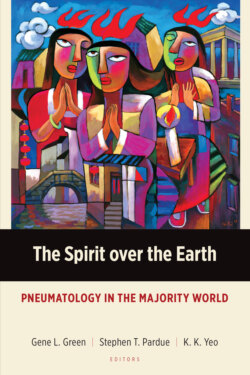Читать книгу The Spirit over the Earth - Группа авторов - Страница 10
На сайте Литреса книга снята с продажи.
Abstract
ОглавлениеThe first section of this chapter provides an overview of the broad spectrum of the Christian tradition and highlights the diversity of its pneumatological thinking, especially in the Eastern Orthodox tradition, Majority World theologies of the past century, and modern pentecostal-charismatic movements. Building on such foundations, the second section of the chapter revisits the third article of the Nicene Creed and suggests how such global perspectives can enrich contemporary pneumatological resourcement even as the latter might be disciplined in light of historic Christian commitments.
The doctrine of the Holy Spirit—pneumatology—is experiencing a contemporary renaissance that promises to correct its relative neglect by the classical tradition.[10] Yet the claim that the Spirit historically has been the “shy” or “hidden” member of the Trinity[11] tells us only half the story when assessed in a world Christian context. This chapter revisits the broad spectrum of the Christian tradition and highlights the diversity of its pneumatological thinking, especially in the past century. Such pneumatological pluralism reflects both the many ways in which the divine breath[1] encounters people across space and time and the various modalities through which understanding of such occurs. Contemporary “third article theology”—which refers to the theology of the Spirit (pneumatology) and theology informed by a Spirit-oriented approach (pneumatological theology)[2]—retrieves and elaborates on the third article of the creed both by being anchored in the revelation of God in Christ and by being open to wherever and however the wind of God blows.
This chapter begins descriptively with an overview of pneumatology in a global historical context, and then shifts toward a constructive theology of the Spirit that is simultaneously a theology inspired by the Spirit (pneumatological theology). As a pentecostal theologian,[3] I find inspiration from the New Testament book of Acts, especially in a number of phrases in the early chapters. The narration of Luke, the author, about Peter’s Day of Pentecost sermon—quoting from the prophet Joel: “God declares, . . . I will pour out my Spirit upon all flesh” (2:17)[4]—invites consideration of the global character of Christian pneumatological reflection, especially non-Western voices and perspectives. Even before this, Luke records Jesus telling the disciples that they will receive the empowerment of the Spirit to be his witnesses “to the ends of the earth” (1:8b). The Greek in this case, eschatou tēs gēs, refers not only to the spatial breadth of the earth but more technically to its temporal ends as well, the ends of the times of the earth, in fact.[5] Both aspects of the Spirit’s outpouring—the spatial and the temporal—are reiterated at the end of Peter’s Day of Pentecost homily where the gift of the Spirit is promised “for you, for your children, and for all who are far away, everyone whom the Lord our God calls to him” (2:39b).[6] So if the first part of this chapter attempts to document the breadth of pneumatological reflection “upon all flesh,” the second section seeks to think creatively with the historical and dynamic deposit of faith, particularly with the Nicene confession about the Spirit, in ways appropriate to the third-millennium global context and beyond.
